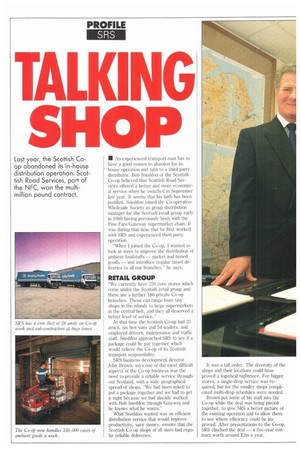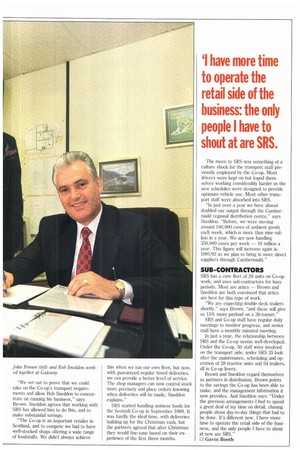Last year, the Scottish Coop abandoned its in-house distribution operation.
Page 44

Page 45

If you've noticed an error in this article please click here to report it so we can fix it.
Scottish Road Services, part of the NFC, won the multimillion pound contract.
• An experienced transport man has to have a good reason to abandon his inhouse operation and turn to a third party distributor. Bob Sneddon of the Scottish Co-op believed that Scottish Road Services offered a better and more economical service when he switched in September last year. It seems that his faith has been justified. Sneddon joined the Co-operative Wholesale Society as group distribution manager for the Scottish retail group early in 1989 having previously been with the Fine Fare/Gateway supermarket chain. It was during that time that he first worked with SRS and experienced third party operation.
"When I joined the Co-op. I wanted to look at ways to improve the distribution of ambient foodstuffs — packet and tinned goods — and introduce regular timed deliveries to all our branches," he says.
RETAIL GROUP
"We currently have 270 core stores which come under the Scottish retail group and there are a further 180 private Co-op branches. These can range from tiny shops in the islands to large supermarkets in the central belt, and they all deserved a better level of service."
At that time the Scottish Co-op had 21 artics, six box vans and 54 trailers, and employed drivers, maintenance and traffic staff. Sneddon approached SRS to see if a package could be put together which would relieve the Co-op of its Scottish transport responsibility.
SRS business development director John Brown, says one of the most difficult aspects of the Co-op business was the need to provide a reliable service throughout Scotland, with a wide geographical spread of shops. "We had been asked to put a package together and we had to get it right because we had already worked with Bob Sneddon through Gateway and he knows what he wants."
What Sneddon wanted was an efficient distribution service that would improve productivity, save money, ensure that the Scottish Co-op shops of all sizes had regular reliable deliveries. It was a tall order. The diversity of the shops and their locations could have proved a logistical nightmare. For bigger stores, a single-drop service was required, but for the smaller shops complicated ;nulti-drop schedules were needed.
Brown put some of his staff into the Co-op while the deal was being pieced together, to give SRS a better picture of the existing operation and to allow them to see where efficiency could be improved. After presentations to the Co-op, SRS clinched the deal — a five-year contract worth around Vm a year. "We set out to prove that we could take on the Co-op's transport requirements and allow Bob Sneddon to concentrate on running his business," says Brown. Sneddon agrees that working with SRS has allowed him to do this, and to make substantial savings.
"The Co-op is an important retailer in Scotland, and to compete we had to have well-stocked shops offering a wide range of foodstuffs. We didn't always achieve this when we ran our own fleet, but now, with guaranteed regular timed deliveries, we can provide a better level of service. The shop managers can now control stock more precisely and place orders knowing when deliveries will be made, Sneddon explains."
SRS started handling ambient foods for the Scottish Co-op in September 1989. It was hardly the ideal time, with deliveries building up for the Christmas rush, but the partners agreed that after Christmas they would fine-tune based on their experience of the first three months. The move to SRS was something of a culture shock for the transport staff previously employed by the Co-op. Most drivers were kept on but found themselves working considerably harder as the new schedules were designed to provide optimum vehicle use. Most other transport staff were absorbed into SRS.
"In just over a year we have almost doubled our output through the Cumbernauld regional distribution centre," says Sneddon. "Before, we were moving around 180,000 cases of ambient goods each week, which is more than nine million in a year. We are now handling 350,000 cases per week — 18 million a year. This figure will increase again in 1991/92 as we plan to bring in more direct suppliers through Cumbernauld."
SUB-CONTRACTORS
SRS has a core fleet of 28 units on Co-op work, and uses sub-contractors for busy periods. Most are artics — Brown and Sneddon are both convinced that artics are best for this type of work.
"We are expecting double-deck trailers shortly," says Brown, "and these will give us 15% more payload on a 38-tonner."
SRS and Co-op staff have regular daily meetings to monitor progress, and senior staff have a monthly minuted meeting.
In just a year, the relationship between SRS and the Co-op seems well-developed. Under the Co-op, 50 staff were involved on the transport side; under SRS 35 look after the maintenance, scheduling and operation of 28 tractive units and 54 trailers, all in Co-op livery.
Brown and Sneddon regard themselves as partners in distribution. Brown points to the savings the Co-op has been able to make, and the management information it now provides. And Sneddon says: "Under the previous arrangements I had to spend a great deal of my time on detail, chasing people about clay-to-day things that had to be done. It's different now, 1 have more time to operate the retail side of the business, and the only people I have to shout at now are SRS."
Li Gavin Booth




































































































